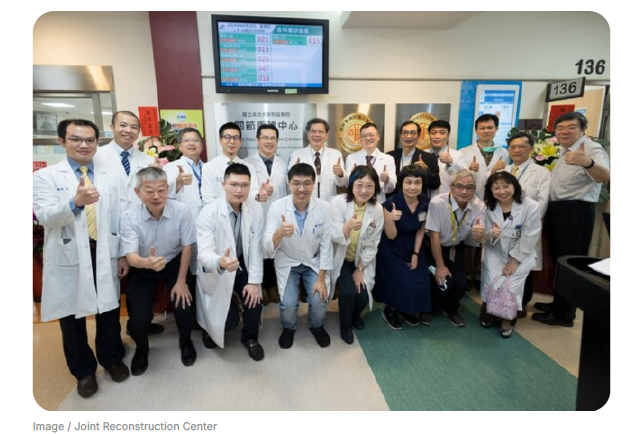Quality Awards
Quality Awards
-
Medical Quality Awards and Certifications
Since 2018, the Hospital has participated in the disease care quality certification promoted by the Joint Commission of Taiwan (JCT), and has passed 11 disease care certifications. By enhancing the quality of disease care teams, the Hospital ensures accessible medical services and builds public trust and recognition.
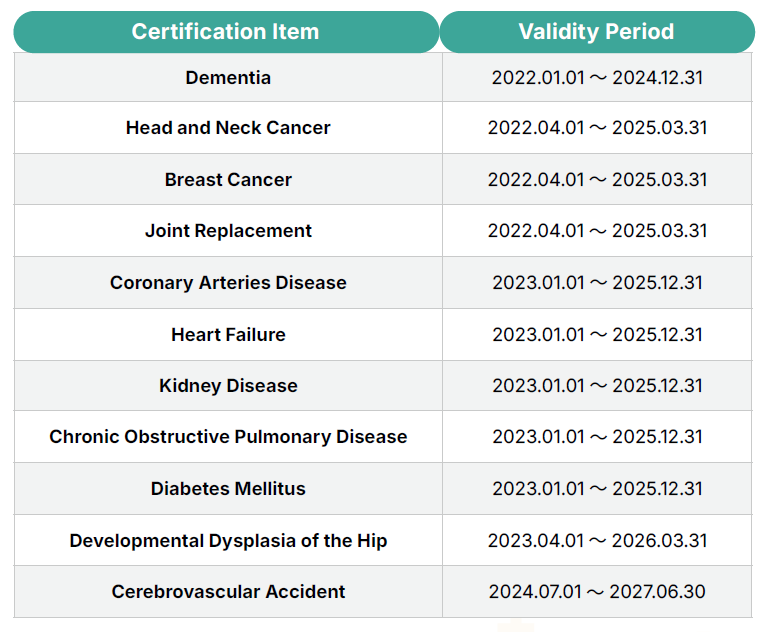
The Hospital has demonstrated outstanding achievements in enhancing medical quality and has been repeatedly recognized in several major national evaluations. These awards not only affirm the dedication of the entire staff but also highlight the Hospital’s unwavering commitment to medical excellence, innovative services, and the promotion of patient well-being. The following summarizes the major awards received in 2024, showcasing the Hospital’s concrete accomplishments in medical quality:
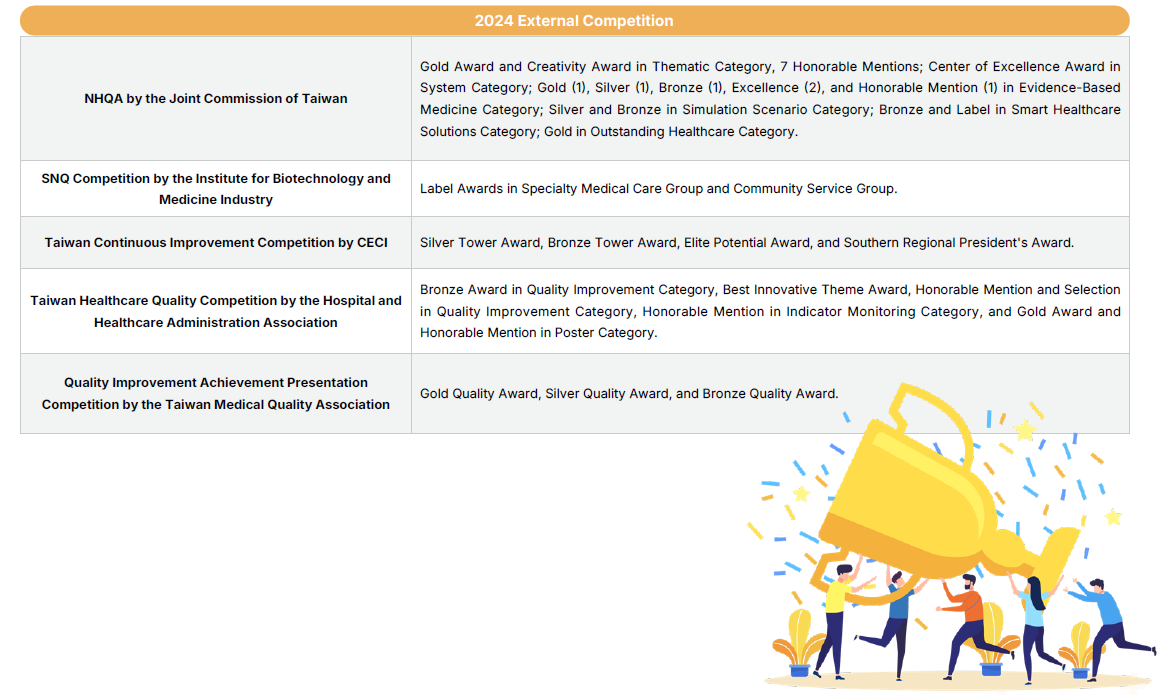
Quality Improvement Case – Example from the Department of Pharmacy
-
Enhancing Dispensing Efficiency through Automation
Since 2019, the Hospital’s pharmacy has progressively introduced various automated equipment to improve dispensing efficiency, allowing pharmacists to dedicate more time to clinical pharmaceutical care. The outpatient pharmacy has implemented box medication dispensing machines, smart refrigerated storage cabinets, fully automated PTP blister packaging machines, and fully automated tablet repackaging machines. These systems are integrated with conveyor belts for automatic delivery, realizing a highly automated process of “medicine finding the pharmacist.”
In inpatient wards, smart medicine cabinets have been installed to store 70% to 80% of commonly used medications. Nurses log in using fingerprint biometric authentication, select the patient and medication, and the cabinet automatically opens the corresponding drawer. This significantly shortens the time required to execute medical orders and reduces the workload of nurses in handling returned medications and pharmacy support staff in medication delivery.

-
Pharmacist Team Develops “Cross-Device Pharmacy Inventory System” to Optimize Stock Management
Traditional medication inventory relied heavily on manual processes, which were time-consuming and prone to errors. To address this, the pharmacist team of the Department of Pharmacy developed the “Cross-Device Pharmacy Inventory System” in 2023. This system supports real-time data synchronization across computers, tablets, and smartphones, and features a dynamic dashboard that continuously displays the inventory progress and manpower status of each area, facilitating flexible support and re-checks of abnormal items.
Completed inventory data can be directly imported into the Hospital’s inventory management system, ensuring data integrity. Since its implementation, the system has significantly reduced labor demands, resulting in a 60% decrease in total overtime hours. Moreover, user satisfaction with the system’s operational fluency and mobility support has reached 95%.
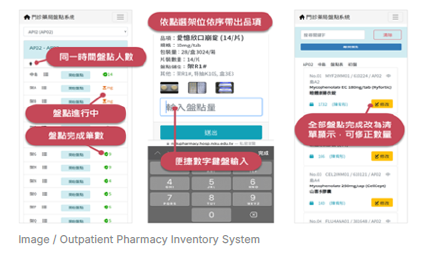
-
Development of Clinical Decision Support Systems to Enhance Pharmaceutical Care Quality
The Hospital’s long-term goal is to alleviate staff workload through automation, allowing pharmacists to focus more on prescription evaluation and patient medication counseling, thereby reducing the risk of medication errors and drug interactions. To comprehensively improve the quality and efficiency of pharmaceutical care, the Hospital has actively developed clinical decision support systems and took the lead in implementing the commercial system Medi-Span® in 2019. This system fully integrates clinical data (including laboratory data, patient medical records, and medication history), converting it into knowledge to support decision-making. It also supports automatic database updates, reducing the maintenance burden on pharmacists and enhancing their work efficiency through technology.
-
Certification and Continuous Improvement
With emergency, critical, complex, and rare diseases as its core medical focus, NCKU Hospital is committed to public health service and actively supports government-led health policies. By integrating cross-departmental medical resources and developing high-level medical technologies, the Hospital has obtained disease care quality certification from the Joint Commission of Taiwan (JCT) in 11 areas: Coronary Arteries Disease (CAD), Heart Failure (HF), Diabetes Mellitus (DM), Kidney Disease, Chronic Obstructive Pulmonary Disease (COPD), Cerebrovascular Accident (CVA), Breast Cancer, Head and Neck Cancer, Joint Replacement, Dementia, and Infant Hip Dysplasia.

At the 24th National Healthcare Quality Award (NHQA) ceremony organized by the Joint Commission of Taiwan in 2024, NCKU Hospital received a total of 36 awards and recognitions in the medical center category, including the “Outstanding Institution Award,” the “20 Years of Continuous Quality Improvement Award,” and the “Smart Hospital Full Institution Mark.” These achievements demonstrate the Hospital’s excellence in enhancing overall quality, promoting quality policies, integrating quality control activities, and planning process management, while also signifying that its overall patient safety and healthcare quality standards have become a national benchmark.
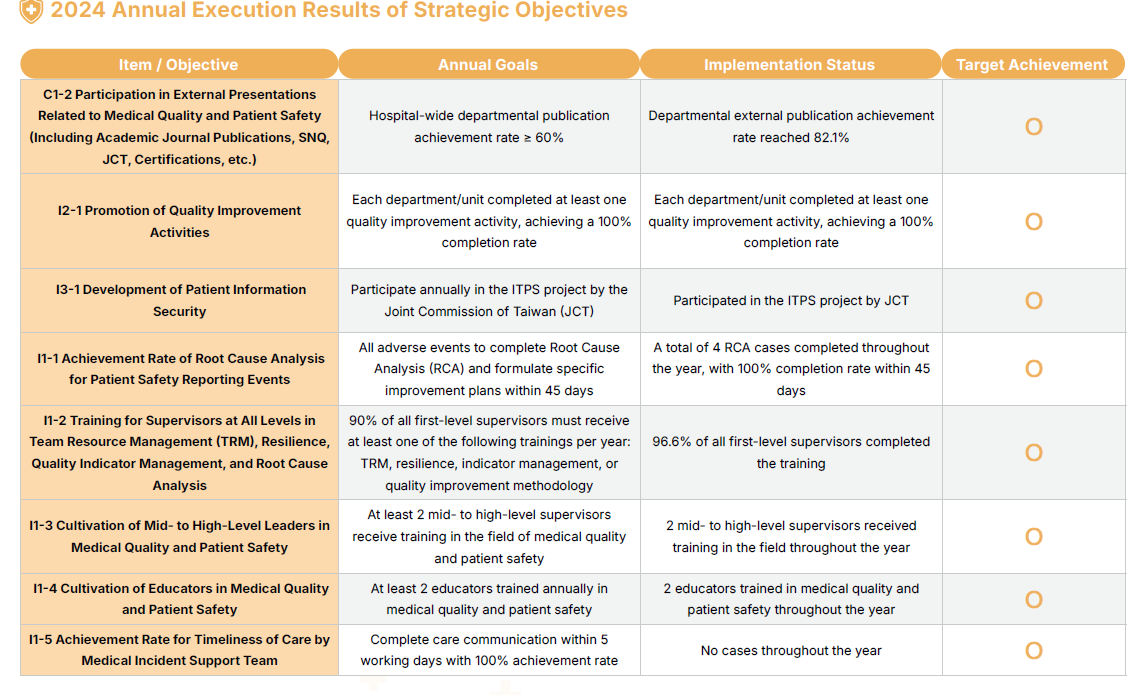
Development of Precision Medicine
-
Advancement of Minimally Invasive Surgery
In response to the rapid development of medical imaging technologies and the trend toward minimally invasive and precision medicine, the Department of Medical Imaging established the "Interventional Medicine Center" in 2017. Interventional medicine, positioned between internal medicine and surgery, involves inserting catheters or other instruments into the body and guiding them using imaging techniques such as ultrasound ,X-ray or computed tomography to achieve precise diagnosis and treatment. It has been widely applied in minimally invasive procedures across cardiopulmonary, cerebrovascular, breast, and musculoskeletal systems.
Image-guided technology is one of the critical factors for the success of minimally invasive surgery, enabling real-time visualization of lesions and tissue structures. By incorporating computer navigation technologies, physicians can use Virtual Reality (VR) and 3D positioning systems to simulate the procedure in three dimensions before surgery and plan the route in advance. This model has already been practically applied in precise procedures such as atrial fibrillation ablation, lung cancer biopsy, and valve repair, significantly improving overall surgical safety and efficiency, shortening patient recovery time, and reducing the risk of complications.
Building upon the aforementioned medical technologies and extensive care experience, the Department of Orthopedics established the “Joint Reconstruction Center” in 2024, providing internationally recognized integrated services, including joint disease screening, prevention, healthcare, and treatment at all stages. The Hospital’s advanced intelligent hybrid operating rooms are equipped with intraoperative real-time CT imaging and mobile fluoroscopic robotic arms. When combined with specialized spinal navigation equipment, high-difficulty spinal deformity correction surgeries can be performed, ensuring precise surgical progress and reducing the risk of nerve injury.
